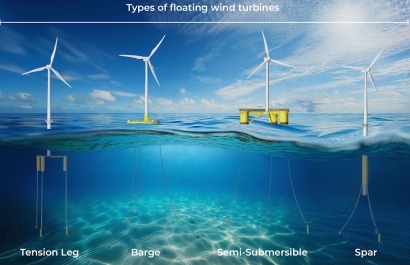
Sustainability science, with its interdisciplinary approach, is key to understanding the complex interplay between human activity and marine ecosystems. Ocean technology plays a pivotal role, offering innovative tools to monitor, protect, and restore ocean health.
Ocean tech tools like satellite remote sensing (eg NASA's MODIS & NOAA tools) and autonomous underwater vehicles (AUVs) delivered real-time data on sea surface temperatures, chlorophyll levels, and currents. These insights helped predict harmful algal blooms, coral bleaching, and ecosystem shifts, allowing timely responses to mitigate damage. Other technologies, such as those from SMRU Instrumentation and Arctic Seaweed , continue to improve marine monitoring and management. These innovations underscore the ocean's vital role in climate regulation and highlight how ocean tech is set to drive smarter, more sustainable marine management.
Harnessing the Power of the Sea & Implications for Marine Biodiversity
Ocean tech is also driving the development of marine renewable energy, including offshore wind and tidal systems. Designs like floating wind farms and tidal turbines are being optimized to minimize ecological disruption while delivering clean energy. For example, the Sea Mammal Research Unit's (SMRU) research at the University of St Andrews ensures renewable energy development aligns with marine conservation. SMRU Instrumentation ’s tagging systems and the open-source software Pamguard help track marine mammals and assess the effects of renewable marine infrastructure.
Multi-beam sonar systems and ultrasonic hydrophone arrays now detect marine mammals in 3D around tidal turbines. These tools help inform policies that reduce risks to marine biodiversity, much like how vessel slowdowns reduce whale strikes and noise pollution.
Marine mammals rely heavily on sound to navigate and communicate. Passive Acoustic Monitoring (PAM) tools, such as hydrophones to more advance Distributed Acoustic Sensing (DAS) using underwater fibre optic cables, help researchers detect whales, dolphins, and monitor overall ocean soundscapes. AI-powered classifiers, such as DelphinID, are now capable of identifying species-specific calls, from bottlenose dolphins to killer whales. Other underwater sounds technologies also support sustainable fisheries. Smart fishing gear and non-lethal acoustic deterrents are being developed to reduce bycatch, which is a significant concern for marine life. One promising solution, Targeted Acoustic Startle Technology (TAST), unlike traditional deterrents, prevents predation without harming marine life and cause hearing damage in marine mammals. Overall, these ocean tech innovations balance marine protection with industry needs.
Innovations in Blue Carbon Technologies and Ocean Farming
As international awareness of ocean sustainability grows, we anticipate increased efforts in developing scalable solutions that not only preserve but also regenerate ocean health. Looking toward 2025, the spotlight is on marine ecosystems, such as kelp forests, that have the potential to sequester carbon and support biodiversity. Regenerative ocean farming offers a natural climate solution. A standout example is algapelago, which is launching a modular kelp and mussel co-cultivation system in North Devon using Norwegian-designed Arctic Seaweed technology. With a projected output of over 3000 tons of sugar kelp and mussels, it’s engineered for high-energy offshore conditions and features automated seeding and harvesting.
This rig is central to algapelago’s Blue Forest project, an initiative exploring large-scale kelp and mussel co-cultivation. The goal is to quantify its nutrient mitigation and ecological benefits and develop robust natural capital metrics.
As co-founder and ocean adventurer Olly Hicks explains, "We are excited to deploy this new rig, as it will accelerate the development of the Blue Forest initiative. This effort will help establish strong future credit markets, promote ecological improvements, and create large-scale opportunities within the blue economy."
Conclusion: Charting a Sustainable Future with Ocean Tech
Overall, ocean tech is advancing marine sustainability through cutting-edge tools for energy, monitoring, and conservation. By integrating these technologies with sustainability science, we’re paving the way for a more resilient and biodiverse ocean. Continued innovation, collaboration, and investment is crucial in protecting our seas and achieving global climate and conservation goals.
About the Author: By Dr. Nora von Xylander, Marine Biodiversity Specialist & Sustainability Scientist at Tunley Environmental.

